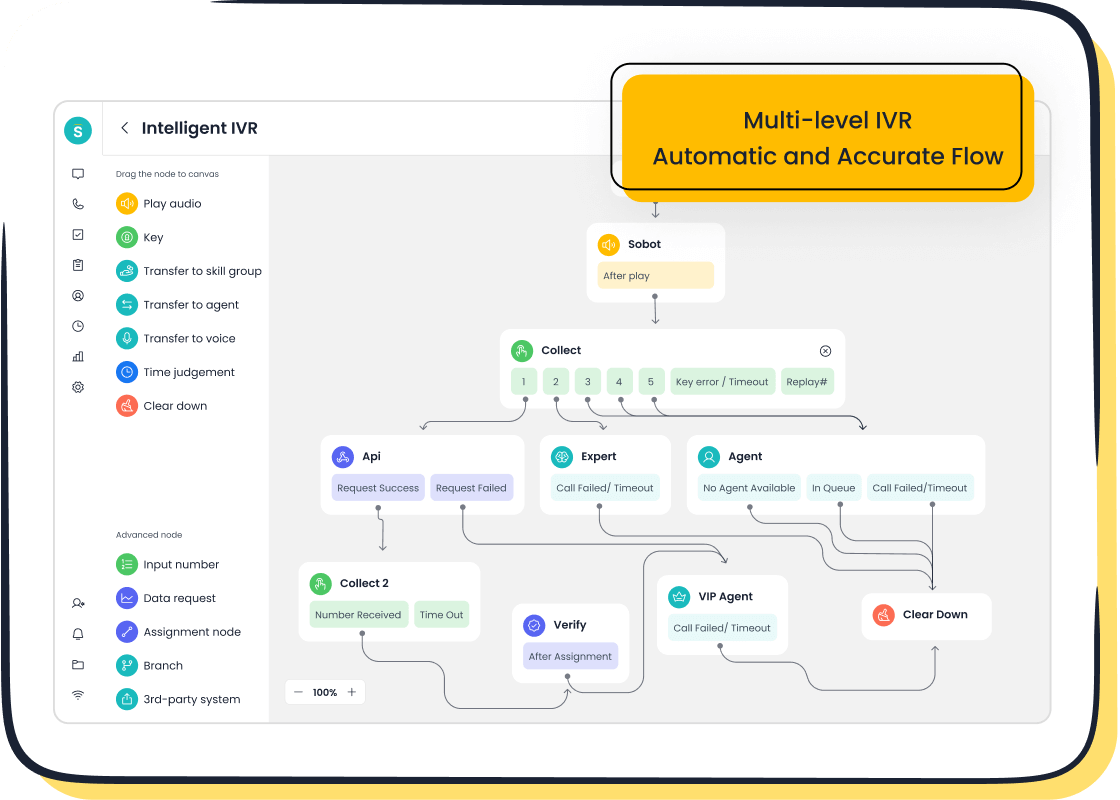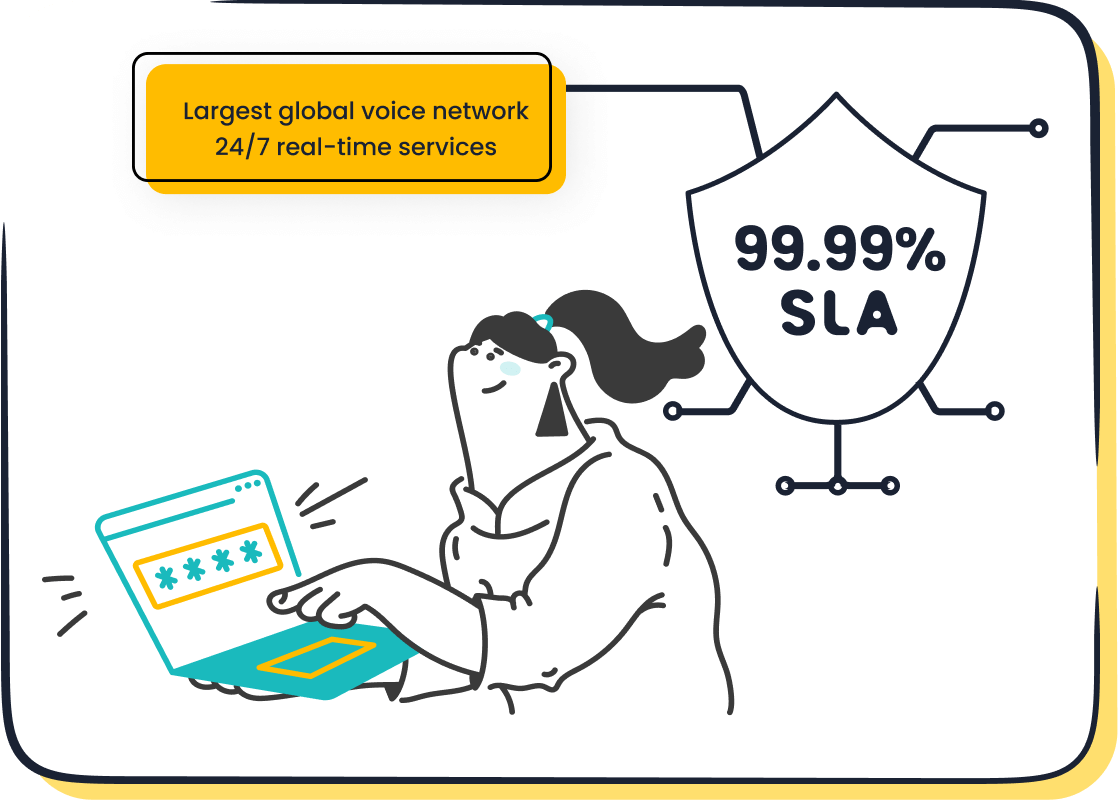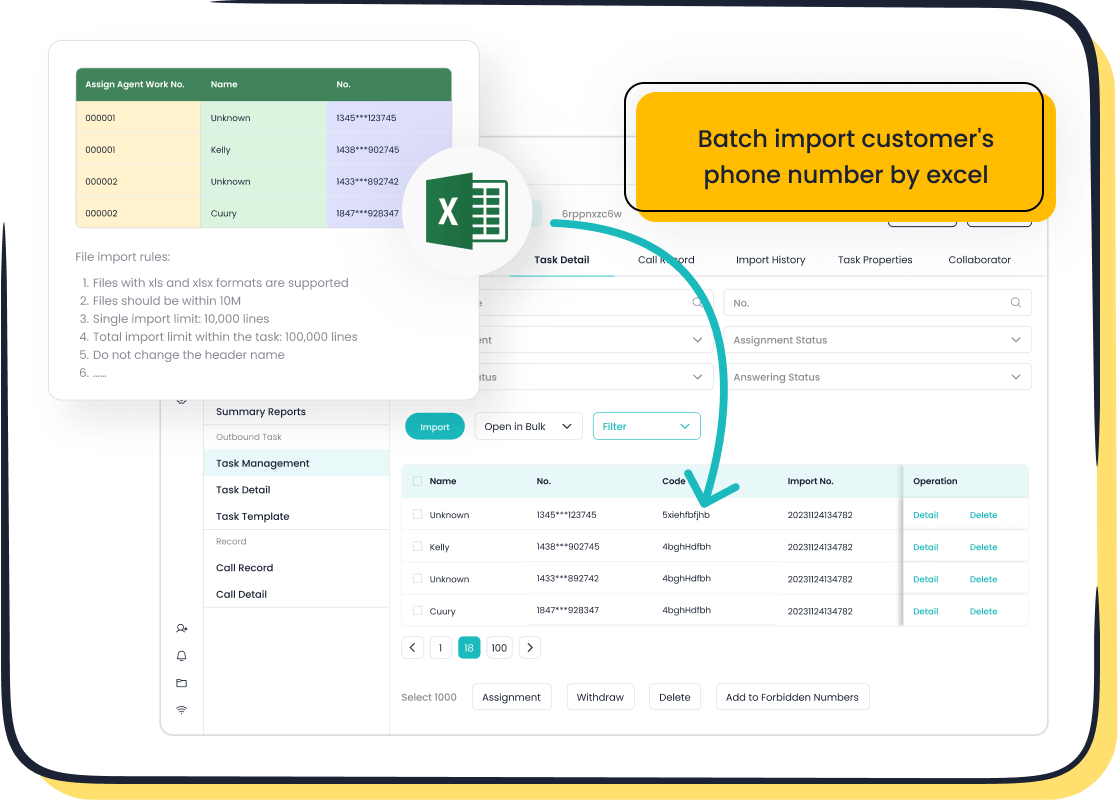How to Choose the Right Phone System for Call Centers

Choosing the right phone system for call centers plays a vital role in delivering seamless communication and exceptional customer satisfaction. A well-suited system ensures efficient call handling, enhances agent productivity, and improves overall customer experience. Factors like business size, budget, and scalability significantly influence your decision. Sobot, a global leader in contact center solutions, offers innovative tools tailored to meet diverse business needs. With features like intelligent IVR and AI-powered Voicebot, Sobot empowers businesses to streamline operations and boost customer satisfaction by up to 40%. A reliable phone system for call centers is not just a tool; it’s a cornerstone of excellent customer service.
Key Takeaways
- Choosing the right phone system is crucial for enhancing communication and customer satisfaction in call centers.
- Look for essential features like call routing, IVR, and CRM integration to improve agent productivity and operational efficiency.
- Consider cloud-based solutions for cost savings and scalability, as they can reduce local costs by up to 40% and international costs by 90%.
- Ensure the system can handle high call volumes with features like Automatic Call Distribution (ACD) and call queuing to maintain service quality.
- Invest in a future-proof system that integrates advanced technologies like AI and analytics to stay ahead of customer expectations.
- Sobot’s Voice/Call Center offers unique features such as intelligent IVR and AI-powered Voicebot, making it a strong choice for modern call centers.
- Evaluate your business size and budget to tailor the phone system to your specific needs, ensuring optimal resource allocation.
Understanding the Role of a Phone System for Call Centers
What Is a Call Center Phone System?
Definition and purpose of a call center phone system
A call center phone system is a specialized communication tool designed to manage inbound and outbound calls efficiently. It serves as the backbone of customer service operations, ensuring that every customer interaction is handled professionally and promptly. This system goes beyond basic telephony by incorporating features like call routing, call recording, and Interactive Voice Response (IVR). These tools help businesses streamline communication, reduce response times, and maintain high service standards.
How it supports customer service and operational efficiency
Operational efficiency also improves as agents gain access to tools like CRM integration, which provides instant access to customer data. This seamless flow of information allows agents to resolve issues faster and deliver personalized service, boosting overall productivity.
Benefits of a Reliable Phone System
Enhancing customer experience and satisfaction
With features like omnichannel support, businesses can provide consistent service across multiple platforms, creating a unified and satisfying customer experience.
Boosting agent productivity and efficiency
Agents perform better when equipped with the right tools. A robust phone system offers features like smart call routing and a unified workspace, allowing agents to focus on resolving customer issues rather than navigating complex systems. Integration with CRM software further enhances efficiency by providing instant access to customer histories. These tools not only save time but also empower agents to handle more calls effectively, increasing overall productivity.

Reducing operational costs and improving scalability
Investing in a modern phone system for call centers can significantly lower operational costs. Cloud-based solutions eliminate the need for expensive hardware and maintenance, offering a cost-effective alternative. Scalability becomes seamless as businesses can easily add or remove features based on their needs. For instance, Sobot’s Voice/Call Center provides global number availability and AI-powered Voicebot capabilities, ensuring businesses can scale operations without compromising service quality.
Key Features to Look for in a Phone System for Call Centers
Must-Have Features
Call routing and queuing for efficient call management
Efficient call routing ensures that every customer reaches the right agent quickly. A robust phone system for call centers should include features like Automatic Call Distribution (ACD) to manage high call volumes effectively. Call queuing organizes incoming calls, reducing wait times and improving customer satisfaction. These tools streamline operations and help your team handle calls more efficiently, even during peak hours.
Interactive Voice Response (IVR) for automated assistance
IVR systems guide customers through self-service options or direct them to the appropriate department. This feature reduces the workload on agents and enhances the customer experience by providing quick solutions. For example, Sobot’s intelligent IVR allows you to customize greetings and menus, ensuring a seamless interaction tailored to your business needs.
Call recording and monitoring for quality assurance
Call recording is essential for maintaining high service standards. It enables you to review interactions, identify areas for improvement, and train agents effectively. Monitoring tools provide real-time insights into call performance, helping you ensure consistent quality. These features are critical for businesses aiming to deliver exceptional customer service.
Advanced Features for Modern Call Centers
Integration with CRM and other business tools

A modern phone system for call centers must integrate seamlessly with Customer Relationship Management (CRM) software. This integration provides agents with instant access to customer data, enabling personalized interactions. Sobot’s Voice/Call Center excels in this area, offering simple and fast integration with existing systems to enhance operational efficiency.
Analytics and reporting for data-driven decisions
Analytics tools transform call data into actionable insights. They help you track key performance indicators (KPIs) like average handle time and first-call resolution rates. With these insights, you can make informed decisions to optimize your operations. Sobot’s platform includes comprehensive analytics and reporting features, empowering you to improve both agent performance and customer satisfaction.
Omnichannel support for seamless customer interactions
Customers expect consistent service across multiple channels, including phone, email, and chat. Omnichannel support ensures that all interactions are unified, creating a seamless experience. Sobot’s Voice/Call Center offers this capability, allowing you to manage customer interactions across various platforms effortlessly.
How Sobot’s Voice/Call Center Stands Out
Overview of Sobot’s intelligent IVR and smart call routing
Sobot’s intelligent IVR simplifies call management with a drag-and-drop interface for building menus and routing calls. Smart call routing ensures that customers connect with the most suitable agent or department. These features enhance efficiency and reduce response times, making your operations more effective.
Unique features like AI-powered Voicebot and global number availability
Sobot’s AI-powered Voicebot uses advanced technology to recognize customer intent and provide intelligent responses. This feature reduces the need for human intervention, saving time and resources. Additionally, Sobot offers global number availability, enabling you to expand your reach and serve customers worldwide without compromising service quality.
Exploring Different Types of Call Center Phone Systems
On-Premises Phone Systems
Overview and functionality
On-premises phone systems operate directly within your company’s physical location. These systems rely on hardware installed and maintained on-site, offering complete control over your communication infrastructure. Businesses often choose this option when they require high customization or need to meet specific regulatory requirements. On-premises systems typically include features like call routing, voicemail, and integration with internal tools.
Advantages and limitations
On-premises systems provide maximum control and data security, making them ideal for industries with strict compliance needs. They allow you to tailor the system to your unique business processes. However, they come with significant upfront costs for installation and hardware. Maintenance and upgrades also require dedicated IT resources, which can increase operational expenses. These systems may lack the flexibility needed for remote work or rapid scaling.
Cloud-Based Phone Systems
Overview and functionality
Cloud-based phone systems operate through the internet, eliminating the need for physical hardware on-site. These systems store data in secure cloud servers, allowing you to access features like call management, video conferencing, and unified communications from anywhere. Cloud-based solutions are particularly beneficial for businesses with remote teams or global operations, as they enable seamless connectivity across locations.
Advantages and limitations
Cloud-based systems offer unmatched flexibility and scalability. You can easily add or remove lines based on your business needs, making them cost-effective for growing companies. They require minimal maintenance since updates and security measures are handled by the provider. For example, Sobot’s Voice/Call Center ensures 99.99% uptime and global number availability, making it a reliable choice for businesses of all sizes. However, these systems depend on a stable internet connection, which could pose challenges in areas with limited connectivity.
VoIP Phone Systems
Overview and functionality
VoIP (Voice over Internet Protocol) phone systems use the internet to transmit voice calls. These systems convert voice signals into digital data, enabling high-quality communication without traditional phone lines. VoIP systems often include advanced features like call forwarding, voicemail-to-email, and integration with CRM tools, enhancing both efficiency and customer service.
Advantages and limitations
VoIP systems reduce costs by eliminating the need for traditional phone lines. They support remote work by allowing employees to make and receive calls from any device with an internet connection. Scalability is another key advantage, as you can adjust the number of users without significant expense. However, VoIP systems rely heavily on internet quality. Poor connectivity can lead to dropped calls or reduced call clarity, which may impact customer satisfaction.
Hybrid Phone Systems
Overview and functionality
Hybrid phone systems combine the best of both on-premises and cloud-based solutions. They allow you to maintain physical hardware on-site while leveraging the flexibility and scalability of cloud technology. This dual approach ensures that your business can enjoy the control of an on-premises system and the adaptability of a cloud-based one. For example, you can store sensitive data locally for added security while using cloud features like remote access and unified communications to enhance operational efficiency.
Hybrid systems are ideal for businesses that need a tailored solution. They support advanced features such as call routing, CRM integration, and analytics while offering the flexibility to adapt to changing business needs. With hybrid systems, you can manage high call volumes effectively and ensure seamless communication across multiple locations.
Advantages and limitations
Hybrid phone systems offer several advantages:
- Flexibility: You can scale operations by integrating cloud-based features without replacing your existing infrastructure.
- Control: On-premises components provide maximum control over sensitive data and compliance requirements.
- Cost-effectiveness: Hybrid systems reduce the need for extensive hardware upgrades by combining existing setups with cloud capabilities.
However, these systems also have limitations. They require a higher initial investment compared to purely cloud-based solutions. Maintenance can be complex, as you need to manage both on-premises hardware and cloud services. Despite these challenges, hybrid systems remain a powerful option for businesses seeking a balanced approach to communication.
Factors to Consider When Choosing the Right Phone System for Call Centers
Business Size and Call Volume
Tailoring solutions for small businesses vs. large enterprises
Your business size plays a crucial role in determining the ideal phone system for call centers. Small businesses often require cost-effective solutions with essential features like call routing and voicemail. Cloud-based systems, such as Sobot’s Voice/Call Center, offer scalability and affordability, making them perfect for growing businesses. For large enterprises, advanced features like AI-powered Voicebots and global number availability become essential. These tools help manage complex operations and ensure seamless communication across multiple locations. By choosing a system tailored to your business size, you can optimize resources and enhance customer satisfaction.
Managing high call volumes effectively
Handling high call volumes efficiently is critical for maintaining service quality. Features like Automatic Call Distribution (ACD) and call queuing ensure that customers are routed to the right agents without delays. For example, Sobot’s smart call routing streamlines this process, reducing wait times and improving first-contact resolution rates. A robust phone system for call centers should also include real-time monitoring tools to help you identify bottlenecks and adjust resources accordingly. These capabilities ensure your team can handle peak periods without compromising service quality.
Budget and Cost Considerations
Comparing upfront costs and ongoing expenses
Understanding the financial implications of different phone systems is essential.
Cost-effectiveness of cloud-based solutions
Cloud-based systems provide significant savings compared to traditional setups.
Scalability and Flexibility
Adapting to business growth and seasonal demands
Your phone system should grow with your business. Cloud-based and hybrid systems excel in scalability, allowing you to add or remove features as needed. For example, during peak seasons, you can increase capacity to handle higher call volumes. Sobot’s Voice/Call Center offers seamless scalability, ensuring your operations remain efficient regardless of demand fluctuations. This adaptability is vital for businesses aiming to maintain consistent service quality while managing growth.
Ensuring future-proof solutions
Investing in a future-proof phone system ensures long-term success. Modern systems, like Sobot’s Voice/Call Center, integrate advanced technologies such as AI and analytics. These features enable you to stay ahead of industry trends and meet evolving customer expectations. Additionally, compatibility with CRM and other business tools ensures your system remains relevant as your operations expand. By choosing a scalable and flexible solution, you can secure a competitive edge in the market.
Integration and Compatibility
Importance of CRM and software integration
Integrating your phone system with Customer Relationship Management (CRM) software and other business tools is essential for streamlining operations. This integration allows agents to access customer data instantly, enabling personalized and efficient interactions. For example, when a customer calls, the system can display their purchase history, previous inquiries, and preferences. This immediate access reduces response times and enhances the overall customer experience.
Modern call center solutions also support integration with tools like email platforms, ticketing systems, and analytics software. These integrations create a unified workspace, where agents can manage multiple tasks without switching between systems. Businesses that leverage such integrations often see improved agent productivity and higher customer satisfaction rates. A well-integrated phone system ensures that your team operates efficiently, delivering consistent service across all touchpoints.
How Sobot ensures seamless integration with existing systems

Sobot’s Voice/Call Center excels in providing seamless integration with existing systems. Its design prioritizes compatibility, allowing you to connect it effortlessly with popular CRM platforms and other business tools. This capability ensures that your team can continue using familiar software while benefiting from advanced phone system features.
Sobot’s platform simplifies integration through its user-friendly interface and robust API support. For instance, you can link the system with your CRM to automatically log call details, track customer interactions, and generate actionable insights. Additionally, Sobot’s solution supports omnichannel communication, enabling you to unify customer interactions across phone, email, and chat platforms.
With Sobot, you gain a future-proof system that adapts to your evolving business needs. Its integration capabilities not only enhance operational efficiency but also empower your team to deliver exceptional customer service. Explore more about Sobot’s integration features on their official website.
Choosing the right phone system for your call center is essential for improving communication and delivering exceptional customer satisfaction. You should focus on key factors like must-have features, system types, and your business needs. Modern solutions, such as cloud-based systems, offer scalability, cost savings of up to 90% on international calls, and seamless integration with tools like CRM. Sobot’s Voice/Call Center stands out with its intelligent IVR, AI-powered Voicebot, and global number availability. Explore Sobot’s solutions to equip your business with a reliable, scalable, and innovative system that adapts to your growth.
FAQ
What is the uptime of Sobot’s Voice/Call Center system?
Sobot’s Voice/Call Center system guarantees an impressive uptime of 99.99%. This ensures uninterrupted service, allowing your call center to operate smoothly without disruptions. High uptime is critical for maintaining customer satisfaction and operational efficiency, especially during peak business hours.
Can Sobot integrate with my existing CRM system?
Yes, Sobot integrates seamlessly with your existing CRM system. It connects effortlessly with popular platforms, ensuring data synchronization and streamlined operations. This integration allows agents to access customer information instantly, enabling personalized and efficient interactions. Sobot also supports integration with ERP and ticketing systems, creating a unified workspace for your team.
Does Sobot support global communication?
Sobot provides global number availability, making it easy for businesses to connect with customers worldwide. This feature is ideal for enterprises with international operations, as it ensures consistent communication across different regions. With Sobot, you can expand your reach without compromising service quality.
How does Sobot ensure data security?
Sobot prioritizes data security by using encrypted data transfer and dialing. This protects sensitive customer information and ensures compliance with industry standards. Whether you’re handling local or international calls, Sobot’s robust security measures keep your data safe.
What features make Sobot’s Voice/Call Center unique?
Sobot’s Voice/Call Center stands out with features like intelligent IVR, AI-powered Voicebot, and smart call routing. The intelligent IVR allows you to customize menus and greetings, while the AI-powered Voicebot enhances customer interactions with intent recognition. Smart call routing ensures calls are directed to the right agents, improving efficiency and reducing wait times.
Can Sobot handle high call volumes?
Yes, Sobot is designed to manage high call volumes effectively. Features like Automatic Call Distribution (ACD) and call queuing ensure that incoming calls are routed efficiently. Real-time monitoring tools help you identify bottlenecks and allocate resources as needed, ensuring smooth operations even during peak periods.
Is Sobot suitable for small businesses?
Sobot offers scalable solutions that cater to businesses of all sizes. Small businesses benefit from cost-effective features like batch outbound calling and intelligent customer information display. The economic SaaS rental model makes it an affordable choice, while the platform’s scalability ensures it grows with your business.
Does Sobot support omnichannel communication?
Yes, Sobot enables seamless omnichannel communication. It unifies customer interactions across phone, email, live chat, and other platforms into a single workspace. This ensures consistent service and enhances the overall customer experience. With Sobot, you can manage multiple channels effortlessly.
How does Sobot help improve agent productivity?
Sobot boosts agent productivity with tools like a unified workspace and CRM integration. These features provide instant access to customer data, reducing response times and enabling personalized service. Smart call routing and real-time analytics further enhance efficiency, allowing agents to focus on resolving customer issues.
Where can I learn more about Sobot’s Voice/Call Center?
You can explore more about Sobot’s Voice/Call Center on their official website. The site provides detailed information about features, benefits, and pricing, helping you make an informed decision for your call center needs.
See Also
Navigating the World of Omnichannel Call Center Solutions
Understanding the Efficiency of Call Center Automation
A Comprehensive Guide to Implementing Omnichannel Solutions
